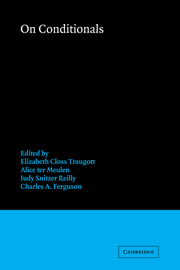Book contents
- Frontmatter
- Contents
- Contributors
- Preface
- Acknowledgments
- PART I GENERAL STUDIES
- PART II PARTICULAR STUDIES
- 5 ON THE INTERPRETATION OF ‘DONKEY’-SENTENCES
- 6 GENERIC INFORMATION, CONDITIONAL CONTEXTS AND CONSTRAINTS
- 7 DATA SEMANTICS AND THE PRAGMATICS OF INDICATIVE CONDITIONALS
- 8 REMARKS ON THE SEMANTICS AND PRAGMATICS OF CONDITIONALS
- 9 THE USE OF CONDITIONALS IN INDUCEMENTS AND DETERRENTS
- 10 CONDITIONALS AND SPEECH ACTS
- 11 CONSTRAINTS ON THE FORM AND MEANING OF THE PROTASIS
- 12 CONDITIONALS, CONCESSIVE CONDITIONALS AND CONCESSIVES: AREAS OF CONTRAST, OVERLAP AND NEUTRALIZATION
- 13 THE REALIS–IRREALIS CONTINUUM IN THE CLASSICAL GREEK CONDITIONAL
- 14 THE HISTORICAL DEVELOPMENT OF si-CLAUSES IN ROMANCE
- 15 FIRST STEPS IN ACQUIRING CONDITIONALS
- 16 THE ACQUISITION OF TEMPORALS AND CONDITIONALS
- 17 CONDITIONALS ARE DISCOURSE-BOUND
- 18 CONDITIONALS IN DISCOURSE: A TEXT-BASED STUDY FROM ENGLISH
- Index of names
- Index of languages
- Index of subjects
16 - THE ACQUISITION OF TEMPORALS AND CONDITIONALS
Published online by Cambridge University Press: 04 August 2010
- Frontmatter
- Contents
- Contributors
- Preface
- Acknowledgments
- PART I GENERAL STUDIES
- PART II PARTICULAR STUDIES
- 5 ON THE INTERPRETATION OF ‘DONKEY’-SENTENCES
- 6 GENERIC INFORMATION, CONDITIONAL CONTEXTS AND CONSTRAINTS
- 7 DATA SEMANTICS AND THE PRAGMATICS OF INDICATIVE CONDITIONALS
- 8 REMARKS ON THE SEMANTICS AND PRAGMATICS OF CONDITIONALS
- 9 THE USE OF CONDITIONALS IN INDUCEMENTS AND DETERRENTS
- 10 CONDITIONALS AND SPEECH ACTS
- 11 CONSTRAINTS ON THE FORM AND MEANING OF THE PROTASIS
- 12 CONDITIONALS, CONCESSIVE CONDITIONALS AND CONCESSIVES: AREAS OF CONTRAST, OVERLAP AND NEUTRALIZATION
- 13 THE REALIS–IRREALIS CONTINUUM IN THE CLASSICAL GREEK CONDITIONAL
- 14 THE HISTORICAL DEVELOPMENT OF si-CLAUSES IN ROMANCE
- 15 FIRST STEPS IN ACQUIRING CONDITIONALS
- 16 THE ACQUISITION OF TEMPORALS AND CONDITIONALS
- 17 CONDITIONALS ARE DISCOURSE-BOUND
- 18 CONDITIONALS IN DISCOURSE: A TEXT-BASED STUDY FROM ENGLISH
- Index of names
- Index of languages
- Index of subjects
Summary
Editors' note. As has been widely noted, conditionals are closely related to both temporal and causal adverbials. Reilly approaches this aspect of conditionals from the vantage point of their acquisition, focusing on the interplay of linguistic and cognitive factors, as evidenced by both naturalistic dialogue and experimental data from preschool children. This paper bears a direct relationship to Harris's account of the historical development of conditionals in Romance languages and Bowerman's discussion of emerging conditionals. Reilly's approach to generic temporals is discussed at length by ter Meulen.
INTRODUCTION
(1) Kate 3;3 (pouring water on cement):
When you put water on it, it sparkles/
Adult: What?
Kate: If you put water on, it sparkles, see?
In a volume such as this, a reader might well ask, ‘Why is a chapter about toddlers and preschoolers included? Of what value can it be to scholars dealing with this complex and weighty topic?’ We hope to show that the process of child language acquisition presents a fertile resource for researchers interested in the basic nature of conditional sentences and their interaction with related language structures. As (I) demonstrates, children at an early age display knowledge of some of the interesting relationships of their language, such as the interchangeability of when and if in some contexts. The emerging cognitive and syntactic systems of preschoolers provide a different perspective on conditionals and allow us to see the basic building blocks of the adult system.
- Type
- Chapter
- Information
- On Conditionals , pp. 309 - 332Publisher: Cambridge University PressPrint publication year: 1986
- 11
- Cited by



